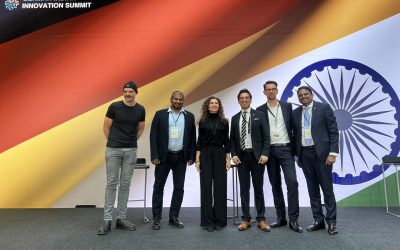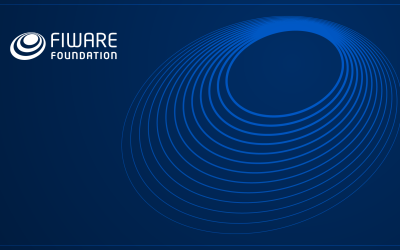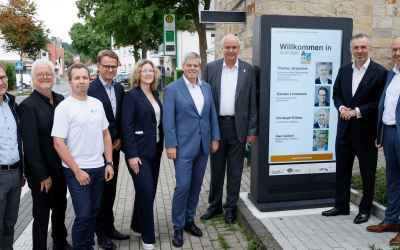Thirty-One municipalities from Finland, Denmark, Belgium, Portugal, Italy, Spain and Brazil launch the ‘Open & Agile Smart Cities’ initiative, targeted to accelerate the adoption of common standards and principles that will transform cities into engines of growth and innovation.
Hannover, 16.03.2015. CeBIT is the place where one of the most important announcements about development of Smart Cities is to be made. The Open & Agile Smart Cities (OASC) initiative, signed by 31 cities from Finland, Denmark, Belgium, Portugal, Italy, Spain and Brazil, aims to kickstart the use of FIWARE standards to foster the development of Smart City applications and solutions. The commitment marks a milestone in the development of Smart Cities, boosting the transformation of cities into engines of growth and well-being through innovation. “The digital evolution of cities is a multifaceted process with a clear focus on the citizen”, says Mário Campolargo, Director “Net Futures” – DG CONNECT at European Commission. “We need to be prepared to take a holistic approach towards Smart Cities, involving IT technologies but also sociologists and architects for all-encompassing solutions”.
Smart Cities from Europe and Brazil
Helsinki, Espoo, Vantaa, Tampere, Oulu and Turku in Finland; Copenhagen, Aarhus and Aalborg in Denmark; Brussels, Ghent and Antwerp in Belgium; the Portuguese Porto, Lisbon, Fundão, Palmela, Penela, Águeda; Milan, Palermo, Lecce in Italy; Valencia, Santander, Málaga, Sevilla, in Spain; and the Brazilian Olinda (Recife), Anapólis (Goiás), Porto Alegre (Rio Grande do Sul), Vitória (Espírito Santo), Colinas de Tocantins (Tocantins) and Taquaritinga (São Paulo), are already committed to implement common standards. “Very few mechanisms are in place to support the digital transition of cities and societies, which in complexity is on the scale of the green transition, if not bigger”, explains Martin Brynskov, chair of the Connected Smart Cities Network Board (CSC). “OASC shows a very concrete way forward with mechanisms that everyone can implement, for the benefit of everyone”.
The goal of this important agreement is to encourage cities to adopt, a first open-licensed standard API implemented in FIWARE targeted to provide a lightweight and simple means to gather, publish, query and subscribe to context information describing what happens in the city at any time. The cities will also collaborate in the definition of common standard open data models based on results of experimentation and actual usage. A first set of common standard open data models will be based on the results of the CitySDK project developed in Europe.
“Seen from a developer’s perspective, one city alone is not a market large enough”, pointed Jarmo Eskelinen, CEO Forum Virium Helsinki. “A number of cities in several countries or a continent, adopting a minimal set of standards form a sizable market on which developers can start investing”. The cities’ commitment helps to overcome the current situation where no system can scale and spread, as there are no standards in place due to little deployment. “Integration with city systems and third-party applications using the Context Information Management API defined in FIWARE is low-cost and non-intrusive”, explained Juanjo Hierro, coordinator and chief architect of FIWARE.
On Tuesday, CeBIT attendees will hear how FIWARE boosts the development of Smart Cities and the Digital Economy at large explained in Marieta del Rivero’s keynote. Del Rivero is Deputy Chief Commercial Digital Officer at Telefonica and member of the FIWARE Executive Board: “This is the right time to define open platforms under standard technology”, she says. “Only this way will ensure that citizens enjoy their digital life without barriers. Today FIWARE sets the standards and that is why Telefónica alongside a number of other companies supports it”. The keynote will be followed by a workshop about how Open & Agile Smart Cities will transform the life of citizens and businesses, conducted by Jarmo Eskelinen interviewing representatives from Tampere, Aarhus and Brussels, which have joined the OASC initiative.
The OASC initiative is governed by the Open & Agile Smart Cities Task Force, overseen by the Connected Smart Cities (CSC) Network Board. More info about the European chapter of the CSC Network can be found at connectedsmartcities.eu.
FIWARE Accelerator Programme
In September 2014, the European Commission launched the FIWARE Accelerator Programme, putting 80 million euros to businesses and entrepreneurs to help them develop projects based on FIWARE technologies. Sixteen accelerators were selected for this ambitious project. The first Open Call has proved the programme to be a success with more than 3,200 submitted projects and 500 selected ones. These startups will carry out development of applications using FIWARE and the FIWARE Lab, an experimentation environment that has already federated 16 data centers in Europe and Latin America. At CeBIT, participants will have the opportunity to meet some of the accelerators (SpeedUP Europe, EuropeanPioneers, FI-C3, Finish and FI-ADOPT) and the startups BIBA GmbH and Digital Worx. The FIWARE Accelerator Programme will be introduced in a keynote by Olaf-Gerd Gemein, coordinator of the SpeedUP!Europe FIWARE accelerator. A case study presented by entrepreneurs and data experts from SpeedUp!Europe will go deeper on Open Data based applications for Smart Cities in Hamburg.
The agreement of the cities has followed the Mobile World Congress 2015 announcement where Telefónica, Orange, Engineering and Atos agreed to join forces towards the adoption of FIWARE standards for Smart Cities and to support activities linked to the creation of an Open Source community around FIWARE technologies.
Additionally, the prestigious cloud-based mapping, analysis and visualization engine CartoDB has also adopted the FIWARE Context Information Management standard API. “The connector we have developed will further expand the capabilities of the FIWARE platform by enabling usage of the most advanced mapping technologies and improving the capabilities of the solutions built on top”, stated Javier de la Torre, CEO at CartoDB. “We have been working with many cities such as New York, Barcelona, and Buenos Aires”, he pointed out.
Even more partners have embraced FIWARE recently. The Korean operator KT Corporation will strengthen FIWARE as the standard for exchanging data coming from applications and services connected to the Internet of Things (IoT).



